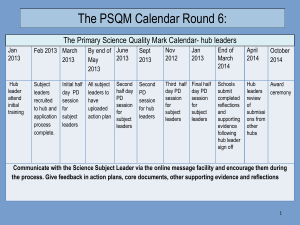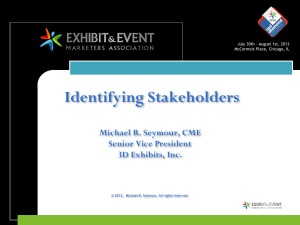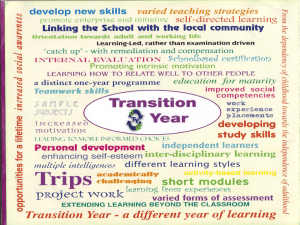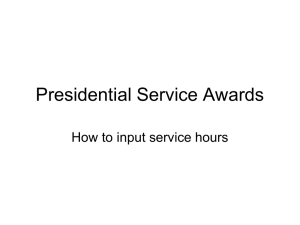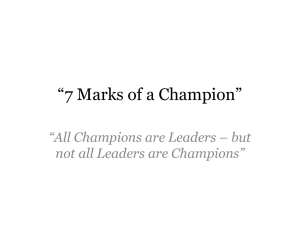PSQM update - Primary Science Quality Mark
advertisement
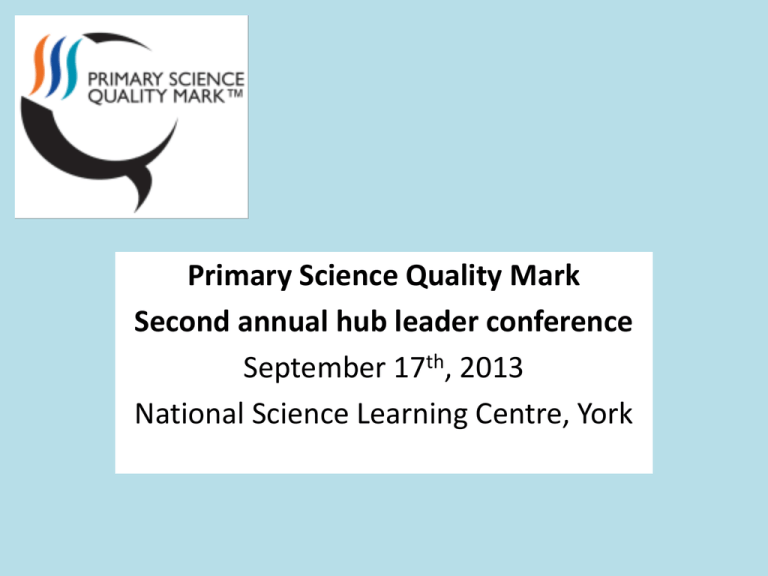
Primary Science Quality Mark Second annual hub leader conference September 17th, 2013 National Science Learning Centre, York 10.30 Update from PSQM team New organisational structure and funding New and revamped partnerships Revised and new materials for training and support Web site changes 11.30 The new POS for Science: What has shaped it? What opportunities and pitfalls does it present? Stuart Naylor Millgate House Education 12.30 Lunch 13.30 Workshop: The stress free way to a great PSQM submission Bryony Turford: Leeds PSQM hub leader 14.30 Refreshment break 14.45 What does it mean to be a Primary Science Specialist? Initial outcomes from the Wellcome Trust Primary Science Specialist Programme Louise Stubberfield: The Wellcome Trust 15.30 Q and A and evaluations 16.00 Close Things to remember (Jane) • Complete your hand out at the end of each session and hand to Sarah at afternoon tea break for copying New organisational structure and funding • Since April 2013 PSQM is a project within the UH School of Education with additional funding from Primary Science Teaching Trust • Governance (exec and advisory ) • Staffing • Finance – revised fees and payments £650/£300 • Formalising of T and C for schools and hub leaders • MOUs with ASE, SLC and Wellcome PSQM: KEY STRATEGIC OBJECTIVES APRIL 2013-18 1. To increase recruitment to PSQM to 1200 UK schools per year by 2016 and maintain at this level which will ensure financial sustainability. 2. To ensure that a PSQM award continues to be accreditation for high quality science provision in primary schools. 3. To increase capacity of partner organisations to support primary science. 4. To research, analyse and disseminate findings of PSQM programme. ASE membership offer PSQM Primary school on-line membership : • Primary Science – 5 issues p.a. of our acclaimed journal • Education in Science – 4 issues p.a. of ASE’s topical house magazine • Access to the special primary area on the ASE website – www.ase.org.uk – (currently under enhancement) • A ‘golden ticket’ for free one day entry to ASE annual national conference for all PSQM school staff members • Advice and guidance on curriculum and safety matters • Access to regional and national CPD • Accreditation – the route to Chartered Science Teacher recognition (CSciTeach) or Registered Scientist (RSci) • Opportunities to network with other schools and science professionals • Discounts on ASE books and resources • Free access to the twice-a-year research journal for early years – Journal of Emergent Science Available to PSQM schools for the special price of £15 + VAT on top of the PSQM fee instead of the stand-alone price of £77 + VAT Primary Science Teaching Trust • PSQM is a PSTT hub • All bids to PSTT that include PSQM need to be referred to PSQM before submitting • Support to enable PSTT college members to become hub leaders • Exemplar website Research • Wellcome published scoping report June 13 • • • • TAPS Bath Spa -Sarah Earle UH case studies Round 4 data sort Research strategy Recruitment • Targeted flyers – for Teaching Schools – Alliances – becoming a hub leader – New SLPs • New poster • Your ideas Award events CSciTeach website See handout ‘new website Round 7 Onwards’ deletion of delete button where not needed once assigned all aspects ready remove mass notifications no documents other than Core one portfolio slot for all levels Section E questions to answer as guidance of content, now needed When assigning levels use Bronze Award, Silver Award, Gold Award NB school systems can limit time on site, and size of upload E: Science at your school Please answer the following questions about your school: 1) What is your DfE number? (check with the school office) 2) Please describe as best you can your school type (Primary, JMI, Inf, Special, Academy, etc) 3) How many classes per year group? 4) How many cohorts/Year groups? 5) Do you have a nursery attached? 6) Do you have a children's centre attached? 7) How would you describe the catchment/intake of children into your school? 8) Have there been any particular developments/circumstances in the last three years that you feel you would like to alert the reviewer to? 9) Looking back through this PSQM year, are there any specific science highlights you would look to headline? 10) What do you feel the school's and your involvement in PSQM this year has done for science at your school? documents 2.9 Activity 5 Focused action planning - the tube activity new material 2.9i Is it outreach? new material Coming soon Round 5 Portfolio examples ‘Outreach examples’ – Impact beyond the school gate Moving forward from Bronze to Silver and also From Silver to Gold Core Document guidance/ advice Impact beyond the school gate! Core Documents Only Advice CRITERIA KEY QUESTIONS BRONZE INDICATORS ACTIONS NEEDED What do I need to do to achieve the indicator? WHO Who is involved? WHEN BY? IMPACT What changes will I see? EVIDENCE What can I use to show this? Date June 2012 CPD Day 1 and 2 PSQM What did I gain? Knowledge of what was needed to gain the award and time to reflect on current position of school 4 times throughout 2012/13 Leadership training Skills to develop a team of science champions all focused on the same aims and vision for science in the school. 19/11/12 What works well….science. Run by local education department Awareness of what was going on in other schools around us. Took away how to use QR codes, subsequently used this in end of term Learning walks. Feb Getting practical How to set questions that will lead to greater critical thinking and independent investigations. Used in ESI week problem videos. Twice termly science network meetings Jumeirah Primary school showed us how they use concept cartoons. I subsequently delivered similar training at xxx. I shared assessment tools (Aiming High, Mini-Sats). Which are now being used at other schools. April Day 3 PSQM Progress so far. Learned how to write reflections and how to reference in portfolio When October 2011 November 2011 January 2012 Action New Role as Science leader Staff Meeting – Aiming High target document Staff meeting – Mini-Sats assessment Impact Start working on Action Plan. Targets and expectations shared with children at start of each topic Teachers now able to use teacher judgment and standardized summative assessment to determine level. More reliable data February 2012 Staff meeting – Independent investigations Inspection feedback discussed with staff. Ideas for increasing children’s independence shared. Each year group challenged to plan for a child- led investigation in next topic. April 2012 Staff meeting - ESI week Antarctic theme. Miss. V visiting Antarctica, what problems might she encounter. Ideas shared and each year group decided on a video problem to be made by NL and Miss. V May 2012 Year group Science champions meeting June 2012 PSQM day 1 September 2012 Staff meeting for new staff First champions meeting. Role and responsibilities discussed Started work on action plan. Reflected on current position of school Assessment procedures shared September 2012 Champions meeting - principles October 2012 Staff meeting - principles November 2012 science network meeting I shared assessment procedures with 4 other schools. Received training on use of concept cartoons. November 2012 Champions meeting – scientific enquiry Skills tracking document introduced. Champions to share with year groups. Greater focus on skills. Sorting of principle activity cards. 15 key areas found. Discussed differences between child and teacher responses In groups teachers ranked 15 key areas. Results were collated and principles document created for teacher files. Principles would form focus of Term 2 informal obs. Date Year All Term 1 3 to 6 27/9/12 Activity/trip/visit Focus area Impact of activities Science club Investigation skills Children carry out different experiments and work together to explain what happened and why. 6 Building Forces and motion Year 6 children were given a construction challenge. The trip taught them about what forces act on buildings. 1/10/12 1 Visitor from cultural heritage centre Growing plants Children became aware of what characteristics plants must have in order to survive in the desert. 23/10/13 1 and 3 4th – 8th/ 11/12 19./12/12 15/1/13 Link up between year groups to share Growing plants/Helping plants what they learned about plant topics grow well Year 3 shared the results of their experiment to find out what was the most important factor for a plant to survive. Year 1 able to see future learning. Whole school Science fair Investigation skills Increased parental involvement and focus on investigation process and skills. Whole school Learning walk Parental involvement Children and parents aware of science learning across whole school not just child’s year group. Habitats Children able to see first hand the habitat of falcons and desert owls and how they survive. 4 Birds of Prey trip Principles of science teaching A2 B3 C3 The feedback showed us that children loved Science when it was in the lab. Interestingly this didn’t feature on any teacher comments. After a discussion with the teachers it was found that the poor acoustics and poor organisation of resources in the lab were what was putting teachers off using it. This led to the science lab being cleared out and re-stocked with all cupboards labelled clearly. Sound proofing has been ordered and will be installed during the summer holidays. The improved layout of the lab has led to it being used more frequently than in the previous year. Playtime science Whole school events and parental engagement The school council conducted a survey to find out how the school could make better use of its outside space. A science area was introduced which was managed by Year 6 science champions. Further feedback highlighted the need for more challenging activities for Year 5/6, this will be a focus next year. B2 C3 Reflection on the impact Through staff meetings and the provision of resources I have encouraged teachers to use pre-topic assessment strategies to determine what children already know and what they want to know (see slides 7 and 10). I have delivered staff meetings which have focused on planning and differentiation. I have suggested the use of ‘will, try, aspire’ success criteria that allows all children to ‘try’ and ‘aspire’ to meet the challenges that may previously been reserved for the most able children (see slide 5) . I have encouraged staff to offer extension and open-ended work for more able children by limiting the support they receive or focusing on their higher order thinking skills (see slide 6). I have recommended science homework that extends and consolidates children’s learning (see slides 16, 18 and 19) and all children have been encouraged to take part of science initiatives at school. For instance, all children took part in the school-wide Science and Technology Week (see slide 11) and all children were invited to spend some time after school with one parent who had brought in a telescope for the children to use (see slide 12). The impact can be seen in book monitoring where children are encouraged to ask their own questions and posttopic assessments allow children to reflect on their learning. Differentiated success criteria creates an environment where all children are encouraged to aim higher and challenges for more able pupils are being planned into lessons which aims to develop the children’s independence. Science homework is set which is fun and engaging. Children’s engagement in and enjoyment of school-based science initiatives, such as Science and Technology Week where children were exposed to real-life science issues, can be seen through their responses to a pupil voice in May 2013 (see slide 13). Next steps: I will continue to find ways to deliver school-based initiatives. For instance, next year there will be another Science and Technology Week and a lunchtime science club will be started. I will also make more home-school connections through parents who work in areas of science. Document References
